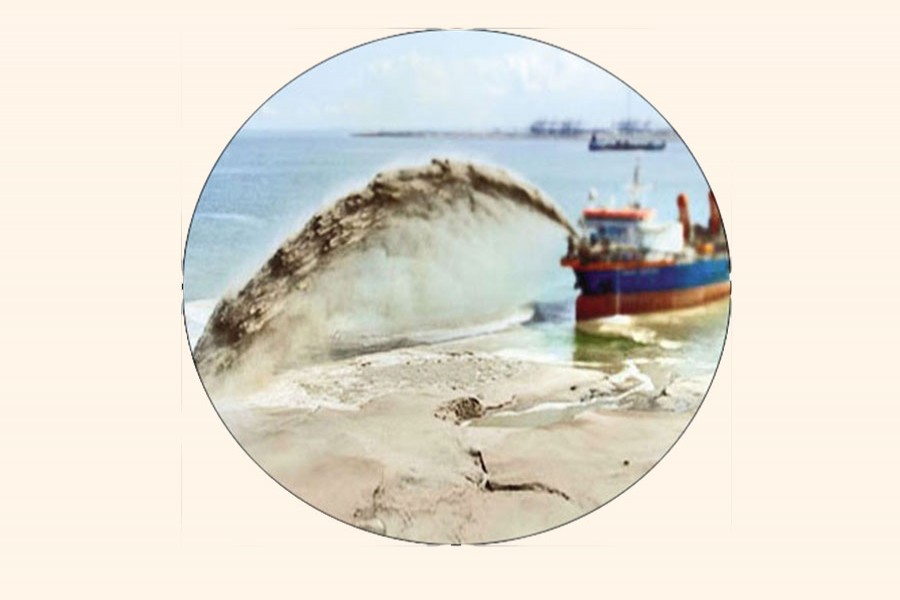Persons concerned about the moribund state of the country's rivers will surely take heart from these words. The words came from State Minister for Shipping Khalid Mahmud Chowdhury. He was speaking at a conference of Deputy Commissioners held at the Osmani Memorial Auditorium in the capital on January 20. While giving directives to the DCs, the state minister stressed the need for preserving the navigability of rivers across the country. He was evidently aware of the evil activities of the river encroaching syndicates. These elements emboldened by their cordial ties to the local political high-ups keep themselves engaged in all kinds of activities leading to the disappearance of many rivers. Of late, the audacity of these people reached an alarming height. They care little for the supervision conducted by the honest public representatives, the administration and river protection platforms. Against this backdrop, the state minister's directive to the DCs to protect the rivers in particular seems timely. In his speech delivered unequivocally, the minister reminded the DCs of their mandatory duty to oversee the state of the rivers.
Addressing the districts' chief executives at the conference, the state minister asked them to go tough on the river polluters, riverbank encroachers and the sand lifters. These activities deprive people of the benefits offered by the rivers. Thanks to the rampant river grabbing, many once-mighty rivers have shrunken to the level of virtual streams. Most of them have lost their normal navigability. Elaborating on the anti-river activities in rural Bangladesh, the state minister told the press after the conference, "The DCs have a role in ensuring the rivers' navigability and protecting rivers from grabbing." Informing that the DCs are the heads of river-related committees at district level, the minister said these committees were tasked with overseeing rivers. The state minister clearly expressed his confidence and trust in the DCs and the committees they headed. He believed the deputy commissioners would be able to strengthen their efforts to preserve, protect and defend rivers from encroachment.
But the harsh truth speaks otherwise. A vital segment of it is the deputy commissioners' posting to a district lasts for a certain stretch of time. The tenures keep varying. In such a situation, few DCs can finally see the results of their years-long efforts to save the dying the rivers. After their shifting to a new district or a promotion, their plans remain half done or get botched. A new district boss might not subscribe to the idea of his or her predecessor. In many cases, the new DCs start the river-saving projects anew --- on the models of their choice. All it means is waste of state money.
Wise counsels on river saving in this country mostly fall on deaf ears. Thanks to the trend of letting the river-encroachers go scot-free, they continue to become more reckless and defiant than in the past. To speak in an unsparing manner, not a single one of the more than 700 rivers across the country is found out of the harm's way. All of these rivers, be they in the country's northern-most area or in the southwestern region or in the southern flank are targeted by one or another syndicate. Even the relatively cleaner and encroachment-free Karnaphuli has fallen victim to the grabbers upstream. The Buriganga beside capital Dhaka is virtually in its death throes. Thanks to the unabated dumping of waste, the four rivers surrounding Dhaka are getting closer to the extinction of their major parts. Except during the brief season of monsoon, water of these rivers remains viscous and greenish and smelly durring the rest of the year.
The State Minister for Shipping spoke eloquently about the imperative of preserving the navigability of the rivers in Bangladesh. People who love to speak without mincing words might find the exhortations a routine job. Ministers and other high-ups have for decades been underscoring the urgent need for bringing back the navigability of the country's major rivers. All these appeals finally proved mere exercises in futility. The most alarming part of these ministerial entreaties is the once-busy rivers like Jamuna, Teesta, Kirtonkhola, Pashur, Meghna and Surma comprise these endangered rivers. Some other large rivers continue to dry up. Stringent bans on sand lifting and other encroachment methods and the resumption of dredging appear to be unable to restore their previous look. Bringing back their full navigability seems an absurd proposition. The Bangladesh High Court's granting in 2019 the country's rivers the status of living entities came as a shock to the country's river grabbers. But upon overcoming the initial bewilderment,the river encroaching syndicates got down to their earlier business. Against this backdrop, the Appellate Division of the Supreme Court of Bangladesh upheld the 2019 decision of the High Court which declared that the Turag River and all other rivers in the country are "living entities" as "living persons". The verdict perhaps is unique to the world. Even in many other river-filled countries, the highestjudicial body cannot be made to feel the urge to take up the case for protecting the rivers.
The widespread apathy for saving a country's rivers has its seeds in the gross negligence in duty on the part of the field-level administration. The elected representatives are equally responsible. In the meantime, the helpless people find themselves relegated to mere passive observers.
It needs not be repeated that the rivers' navigability is a sine qua non for Bangladesh. The country can ill afford to look the other way when its rivers turn moribund due to encroachment and mindless sand lifting. The nation shouldn't forget that the growth of a large part of its agri-sector and its domestic trade is still dependent on its rivers.


